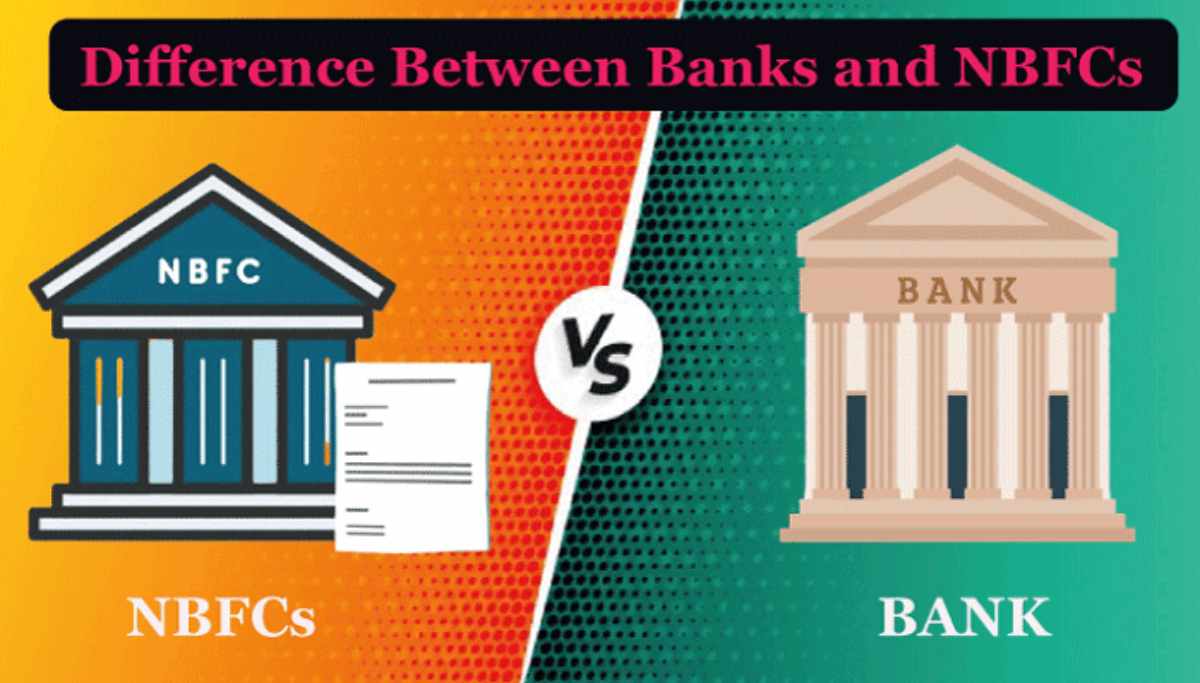Banks have always been one of the most prevalent financial institutions around the globe. Apart from banks, there are also non-bank financial companies commonly called NBFC that perform lending and other financial activities. Although resemblances exist between NBFCs and banks, both of these also differ in many aspects. The main difference between NBFC and a bank is that a bank is accountable to the RBI whereas an NBFC is registered under the Companies Act, 1956.
NBFC
NBFC expands to Non-Banking Financial Company and is a company registered under the Companies Act, 1956, and controlled by the Central Bank i.e. Reserve Bank of India under RBI Act, 1934. These bodies are not banks, but they are involved in lending and similar activities, similar to that of banks like administering loans and advances, dealing in the money market, credit facilities, savings, and investment commodities, regulating portfolios of stocks, transfer of money and so on.
NBFC is indulged in the actions of hire purchasing, leasing, infrastructure finance, venture capital finance, housing finance, etc. An NBFC acknowledges deposits, but is only limited to term deposits, deposits repayable on demand are not accepted by the Company.
In India, these companies developed in the mid-1980s. Kotak Mahindra Finance, SBI Factors, Sundaram Finance, ICICI Ventures are some popular examples of NBFCs.
NBFC is further divided into three categories :
- Asset Companies
- Loan Companies
- Investment Companies

The Banks
Banks are the financial organizations, authorized by the government to manage several banking activities like accepting deposits, granting credit, managing withdrawals, paying interest, clarifying cheques, and administering general utility services to the customers. Banks are the apex organization, which controls the complete economic system of the country. It acts as a financial mediator, between the depositors and borrowers, which assures the effortless functioning of the economy.
Banks can be of different types such as public sector banks, private sector banks, or foreign banks. Ownership of a commercial bank lies with the shareholder. Also, all of these banks are answerable for loans, creating credit, mobilization of deposits, safe and time restrained transfer of money, and administering public utility services.
Points Of Difference Between NBFC And A Bank
- Authorization
The first and major difference between NBFC And A Bank is their level of authorization. NBFCs are not compelled to keep a banking license to equip banking services to the public. In contrast, banks are authorized by governments and their preeminent goal is to benefit the general public.
- Foreign investment
The percentage granted to banks for making a financial investment is 74 per cent while NBFCs can make a financial investment of up to 100 per cent, which is considerably higher.
- Constitution
As discussed above, the NBFCs were formed under the Companies Act of 1956. Banks were registered under the Banking Regulation Act of 1949. Thus, organizations follow different rules and regulations for the arrangement of services.
- Deposit on request
The demand deposit or DD is a fund from which an individual can withdraw a deposit, irrespective of the time, from the financial institution. NBFC does not acknowledge DD for any financial transaction. Nonetheless, these accounts are broadly used in banks for making payments.
- Maintenance of the reserve ratio
The reserve ratio is a part of the depositor’s balance that is supposed to be held by a cash bank as formulated by the central bank in most countries. There is no need for NBFCs to uphold a reserve ratio to function in the economy, but banks need to do this as it influences the money supply in a country over a specific period.
- Payment and balance system
One way how NBFC is different from a bank is that banks are the core of the payment and settlement system while NBFCs are not a part of it.
- Deposit insurance system.
The deposit insurance structure provided by deposit insurance and the credit guarantee company is not accessible for NBFCs, though banks can absolutely use this structure to secure their clients’ money.

To Sum Up
NBFCs are primarily formed to provide credit to the poor section of the society, while the banks are authorized by the government to obtain deposits and grant credit to the public of the country. The licensing regulations of a bank are more binding than that of an NBFC. Furthermore, a bank is not allowed to operate any business except the banking business, while an NBFC can operate such business.
It is very crucial to determine the differences between these institutions as the institution which is the right one for you can help you make better choices based on your financial goals. With rapidly changing market trends, every penny counts, so picking the right institution is one of the chief decisions to make.
Thanks for reading this blog on All About The Difference Between NBFC And A Bank. If you liked the article, do visit UniCreds to find student finance solutions.
FAQs
1. What is the difference between fixed deposits in NBFCs vs and Banks?
NBFC interest rates are usually higher than those given by banks. While bank FDs are low-risk investments that provide income tax benefits, NBFC FDs provide higher returns.
2. Is there a lending difference between banks and NBFCs?
In terms of lending, banks often target both corporations and retailers. NBFCs, on the other hand, are more focused on the retail sector. Another distinction is the issuance of credit cards. Banks usually provide credit cards of varying types based on the needs of their consumers, but NBFCs do not.










0 Comments